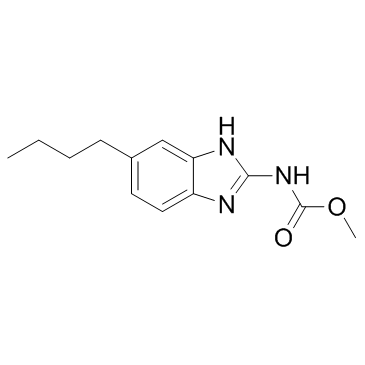Journal of Cell Science
1981-06-01
Binding of parbendazole to tubulin and its influence on microtubules in tissue-culture cells as revealed by immunofluorescence microscopy.
J C Havercroft, R A Quinlan, K Gull
Index: J. Cell Sci. 49 , 195-204, (1981)
Full Text: HTML
Abstract
We have shown that the benzimidazole carbamate, parbendazole, is a potent inhibitor of microtubule assembly in vitro and in vivo. Radiolabelled parbendazole was shown to bind to purified tubulin. Immunofluorescence studies using antitubulin antibody showed that parbendazole effectively depolymerizes cytoplasmic microtubules in animal cells leaving only one or two microtubules associated with one centriole. The usefulness of parbendazole and other benzimidazole carbamates as inhibitors of microtubule functions is discussed.
Related Compounds
| Structure | Name/CAS No. | Molecular Formula | Articles |
|---|---|---|---|
 |
Parbendazole
CAS:14255-87-9 |
C13H17N3O2 |
Related Articles:
More...
|
Microtubule disruption synergizes with oncolytic virotherapy...
2015-01-01 [Nat. Commun. 6 , 6410, (2015)] |
|
Development and validation of an ultra high performance liqu...
2014-07-01 [J. Chromatogr. B. Analyt. Technol. Biomed. Life Sci. 962 , 20-9, (2014)] |
|
Controlled tests of activity of several antiparasitic compou...
1993-03-01 [Am. J. Vet. Res. 54(3) , 406-10, (1993)] |
|
The effect of co-administration of parbendazole on the dispo...
1992-03-01 [J. Vet. Pharmacol. Ther. 15(1) , 10-8, (1992)] |
|
Effect of parbendazole and piperazine adipate on the activit...
1987-05-01 [Vet. Parasitol. 24(3-4) , 211-20, (1987)] |